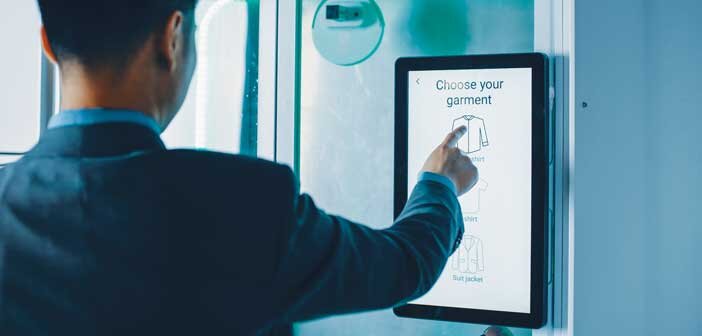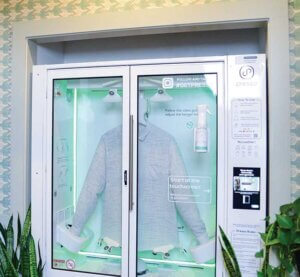Imagine this scenario: You’re a business traveler who’s run out of clean clothes for your next meeting. You can’t send out your suit for dry cleaning, as it will take too long. Your two options, then, are to take out the iron to hopefully make the clothes look presentable, or waste time running hot water in the guestroom bathroom to steam them. But neither solution will clean your clothes.
Sandy Springs, GA-based Presso has come up with a solution to clean clothes that is easy to use for the guest, and good for both the hotel’s bottom line and the environment. The company’s on-demand, eco-robotic express garment care machines can clean garments in minutes, while using less electricity and water than traditional laundry and dry-cleaning services.
Nishant Jain, cofounder/CEO, Presso, came up with the idea when he had to do laundry and dry cleaning for the first time after emigrating to the U.S. from Delhi, India, eight years ago.
“It seemed like a painful chore, and nobody was questioning it or trying to improve it,” he said. “It had stayed the same for my parents and my grandparents. It has never changed.”
The machine’s three-step system of pressing, cleaning and drying is done via artificial intelligence and computer vision automated robotics. Jain noted that the company created new technologies to perform the tasks.
“Pressing involves our stretcher robotics,” he said. “There are different moving parts that stretch each type of garment. This is a new innovation that we brought on where if you can apply the right kind of stretching force, and add heat and moisture, these three elements provided the right way can create pressing quality as if you manually sat down and ironed it or gave it to a dry cleaner.”
For the cleaning process, the machine uses the pressurized hot steam created during the pressing portion and adds Presso’s in-house-developed clean liquid. “We developed an eco-friendly liquid unlike dry cleaners that use Perchloroethylene (PERC),” Jain said. “A lot of consumers today are more aware of dry cleaning and the toxic chemicals it uses, and they’re choosing to go with greener alternatives.” He added that the company also uses proprietary technology for the drying process
For guests, the experience is very similar to that of a vending machine. “You go up to it with your garment, put it inside the machine and tell it what it is— that’s it,” said Jain, who cofounded the company with fellow Purdue University grad Thibault Corens, who serves as the company’s chief technology officer. “It will take a few minutes to do the processing. In just five to six minutes, you have something that is ready to wear.”
Jain added that it will currently take about 10 to 15 minutes to full press, clean and dry a suit, but that time period is expected to be even faster as data is collected on the different type of garments and fabrics.
“The more garments we do over time, the better and better performance we’ll get as we collect data for the sensors and internal cameras,” he said. “Within a year or two, we believe we can get close to two to three minutes per garment, and within three or four years. 60 to 90 seconds per garment.”
Jain pointed out that the company plans for one machine per 300 to 400 rooms, “but as soon as you go beyond that, it might be useful to get another machine in a different location.”
Hotel clients pay for the machines via a subscription plus revenue-share model typically. “We realized when talking to a lot of hotel owners, nobody wants to—especially in the middle of the year— budget out thousands of dollars to buy new hardware,” said Jain. “Instead, it’s much better for them to have no upfront costs. They just pay a monthly subscription to keep the hardware. We own, manage and maintain the machine.”
The costs for guests is “much less than a dry cleaner,” he said, adding, “We actually work with the hotels to set the pricing. We typically guide them based on their location and what the area’s dry cleaners charge. One thing to note is guests frequently complain about the high costs of hotel dry cleaning. But, it’s not the hotel’s fault. The dry cleaners are the ones that are spiking the price to guarantee a fast turnaround.”
With sustainability top of mind for both hoteliers and guests, the Presso machine has a number of eco-friendly features, including using seven times less water and three times less electricity than traditional laundry and dry-cleaning services, according to the company. It also reduces the carbon footprint of today’s clothing care by 93%.
“Also, the liquid that we use is non-toxic and biodegradable,” said Jain, who added, “One factor that drastically changes the carbon footprint is transportation. We’re not shipping clothes back and forth. There’s no logistics and no disposable hangers. For the hotel, there’s no more paper receipts in every room that have to be replaced.”
The company has booked 89 hotels— all part of a handful of ownership groups—for machines, according to Jain, who said, “We currently have five live machines, and we’re launching more every month. Out of those five, three are in hotels.”
He pointed out that Presso will be installing a machine in a 700-room hotel in Chicago, and is in talks with some properties in New York.
“We’re now expanding into some of these metropolitan areas where we see a lot of business travel,” he said.




